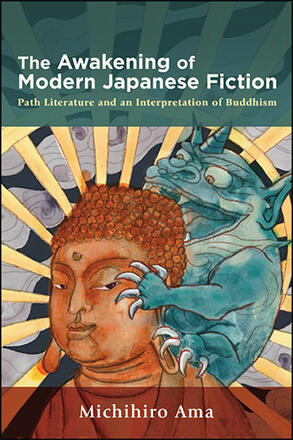
The Awakening of Modern Japanese Fiction
Path Literature and an Interpretation of Buddhism
Alternative formats available from:
Argues that the role of Buddhism in modern Japanese prose literature has been significantly overlooked.
Description
The Awakening of Modern Japanese Fiction is the first book to treat the literary practices of certain major modern Japanese writers as Buddhist practices, and to read their work as Buddhist literature. Its distinctive contribution is its focus on modern literature and, importantly, modern Buddhism, which Michihiro Ama presents both as existing in continuity with the historical Buddhist tradition and as having unique features of its own. Ama corrects the dominant perception in which the Christian practice of confession has been accepted as the primary informing source of modern Japanese prose literature, arguing instead that the practice has always been a part of Shin Buddhist culture. Focusing on personal fiction, this volume explores the works of literary figures and Buddhist priests who, challenged by the modern development of Japan, turned to Buddhism in a variety of ways and used literature as a vehicle for transforming their sense of selfhood. Writers discussed include Natsume Sōseki, Tayama Katai, Shiga Naoya, Kiyozawa Manshi, and Akegarasu Haya. By bringing Buddhism out of the shadows of early twentieth-century Japanese literature and elucidating its presence in both individual authors' lives and the genre of autobiographical fiction, The Awakening of Modern Japanese Fiction demonstrates a more nuanced understanding of the role of Buddhism in the development of Japanese modernity.
Michihiro Ama is Karashima Tsukasa Associate Professor of Japanese Language and Culture at the University of Montana. He is the author of Immigrants to the Pure Land: The Modernization, Acculturation, and Globalization of Shin Buddhism, 1898–1941.
Reviews
"This book will be welcomed by anyone interested in the spiritual sources of modern Japanese literature, and in particular, the profound influence Buddhism continued to exert on that literature in the early twentieth century, despite the mounting incursions from the Judeo-Christian West … [an] excellent study, which no doubt will encourage further research in this fascinating but rather neglected area." — The Eastern Buddhist
"One of the major contributions of Ama's work, then, has to do with insisting on whole fabric rather than rent cloth. In other words, The Awakening of Modern Japanese Fiction is part of a larger academic move to see modern Japanese literature not as emerging (only) out of a complete rupture with premodern concerns and conditions but as (also) bearing important threads of continuity." — Journal of Japanese Studies
"Ama's fascinating, innovative book presents the work of modern Japanese literary writers as Buddhist practice and revisits the idea of confession in Japanese literature, revealing the influence not of Christianity, as previous scholars have suggested, but of Shin Buddhism." — CHOICE